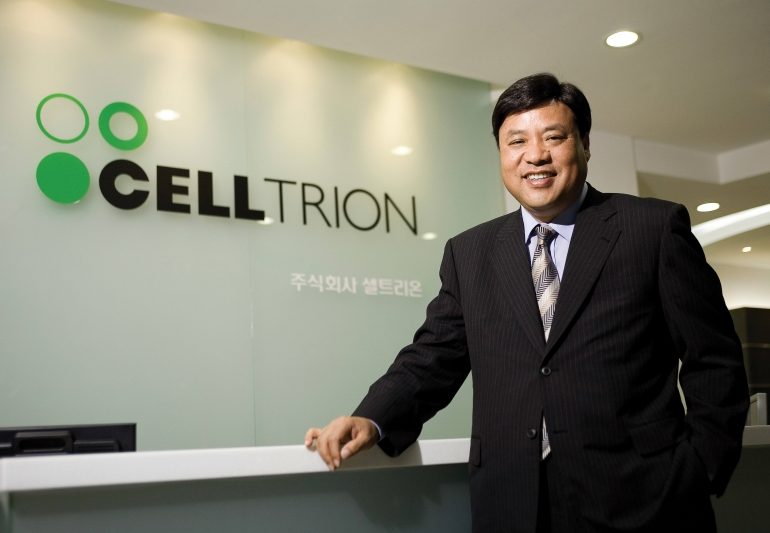Optimism that new testing kits and treatments developed by Celltrion can help to bring the coronavirus pandemic under control is boosting the wealth of the company’s 62-year-old founder Seo Jung-jin.
The self-made South Korean entrepreneur has seen his net worth rise to $8.3 billion, up $2.2 billion since Forbes calculated the fortunes of the World’s Billionaires on March 18, as shares of his biotech company soared 37.6% since then.
Investors are hopeful Celltrion can meet its timetable for developing an effective treatment for the pandemic that has infected more than 2 million people globally and sparked the worst recession since the 1930s Great Depression.
“Given the expedited development process of our antiviral antibody treatment, we anticipate moving to first-in-human clinical trials in July,” Celltrion’s head of research and development, Kwon Ki-sung, said on Monday.
“We are also on track with the development of a ‘super antibody’ or ‘an antibody cocktail’ and the launch of a rapid self-testing diagnostic kit in the summer of this year,” added Kwon. Celltrion’s testing kits are said to be able to provide results within 15 to 20 minutes.
Celltrion specializes in biosimilars, which are cheaper copies of off-patent biotech drugs, but the company has recently shifted its focus to help battle the coronavirus pandemic.
South Korea has been among the hardest hit by the coronavirus in Asia, with 10,591 confirmed COVID-19 cases and 225 deaths as of Wednesday. But the country managed to contain the coronavirus and flatten the curve without shutting down its economy, thanks in large part to widespread testing.
Through a partnership with the South Korean Ministry of Health and Welfare’s Korea Centers for Disease Control and Prevention, Celltrion said it has selected 14 “powerful neutralizing antibodies against SARS-CoV-2” from an initial list of 300 types of antibodies. After Celltrion grows the antibody candidates, it will roll out mass production and conduct tests.
Celltrion reported 2019 sales of $968 million, a 14.9% increase from the previous year.
An industrial engineer by training, Seo first worked at Samsung Electro-Mechanics, an electronic parts maker of the Samsung conglomerate, in the 1980s. He later became a senior executive at South Korean carmaker Daewoo Motor, but left the company in 1999 during the Asian financial crisis; Daewoo eventually went bankrupt in 2000, which was then the world’s largest bankruptcy.
“My mother-in-law called me, asking what I would do to make money,” he recalled to Forbes in 2009. “I was sick and tired of her nagging, so I decided to do something myself.” Together with former Daewoo colleagues, Seo started Celltrion in 2002 and is now the second-richest man in South Korea.
The Incheon-based company went public in 2008 through a backdoor listing of Kosdaq-listed Orchem. In 2018, Celltrion transferred to the main Kospi board, where its market cap has grown to its current level of 27.7 trillion won (about $22.8 billion).
To be sure, Celltrion is not the only biotech company in South Korea working to combat the coronavirus. Biosimilar rival Samsung BioLogics, part of the Samsung conglomerate, announced on April 10 that it is partnering with Nasdaq-listed Vir Biotechnology in a $362 million deal to manufacture the U.S. drugmaker’s coronavirus treatments. Vir will begin its second phase of clinical trial within the next three to five months and Samsung Biologics expects to start commercial manufacturing of the treatments next year.
Shares of Kospi-listed Samsung Biologics jumped 16.8% on the Vir deal. Since March 18, its shares are up 35.3% as of Wednesday. The fortune of Samsung Group chairman Lee Kun-hee rose $1.7 billion to $15.8 billion, making him the wealthiest person in South Korea.













